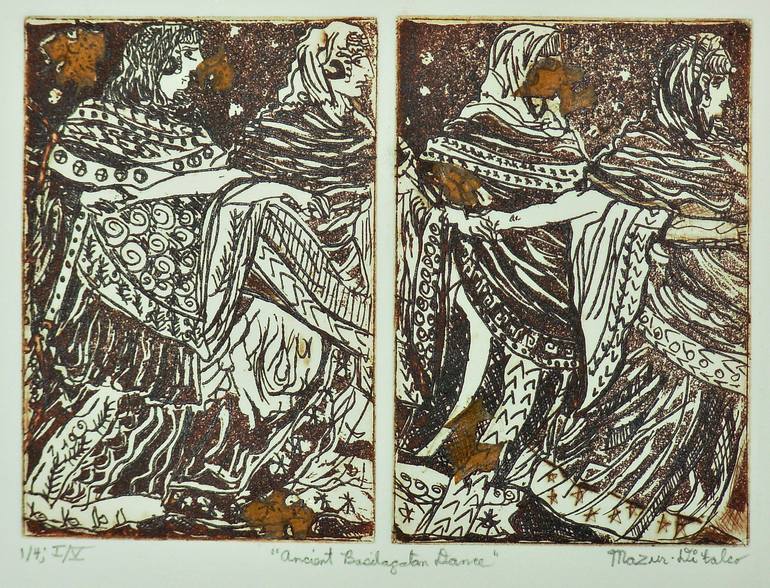


VIEW IN MY ROOM
ANCIENT BASILAGATAN DANCERS - Limited Edition of 4 Print
United States
Printmaking, Etching on Paper
Size: 16 W x 12 H x 1 D in
Ships in a Box
Artist Recognition

Artist featured in a collection
About The Artwork
This mysterious etching, executed on two zinc plates each of which required six baths in Nitric acid, was hand-printed by the artist at The Center for Works on Paper in Philadelphia, Pennsylvania. The plates each measure 4 inches wide by 6 inches high, which makes the overall image about 6 inches high by 8.25 inches wide. The print on paper measures about 11 inches high by 15 inches wide. The frame is about 12 inches by 16 inches. Media include oil-based etching ink (a blend of five colors) printed on Rives FBK white paper. A Thai mulberry bark paper was used in eight areas of this edition. The studio techniques include INTAGLIO, AQUATINT, DRYPOINT, & CHINE COLLE. This work’s price includes a wood/glass frame (color gold), archival mat, shipment carton, bubble wrap and other packing materials, as well as all shipment costs. It comes with a craft paper backing glued to the frame and a hanging hook and nail. The artist based this etching on his original drawings inspired by a museum slide of the work. This is the FIRST edition of FIVE; and, each edition is limited to only four etchings. The scene depicts female dancers from a funeral in ancient Italy. NARRATIVE: Ruvo, painted slab of tomb 11, representing the threnos of dancers, funeral dance around the corpse, by Master of the Ruvo Painting, 5th Century -4th Century b.C.,, fresco on limestone. Italy; Campania; Naples; National Archaeological Museum. Detail. Ruvo fresco-painted slab threnos dancers yellow brown sky-blue red light blue/azure frieze sepulchral chamber procession young women. Altra splendida opera proveniente dall’allora Real Museo Borbonico di Napoli, la lastra delle Danzatrici di Ruvo, che deve il suo nome alla misteriosa danza rituale affrescata sulle pareti di una tomba ipogeica a semicamera ritrovata nella località pugliese nel 1833 e appartenuta probabilmente ad un ricco personaggio di spicco della Ruvo di inizio IV secolo a.C. L’affresco delle danzatrici fu staccato dalle pareti della tomba e venduto in blocchi separati nel 1838, finendo a Napoli che ne presta , per la mostra, una lastra per incantare il pubblico con la sua bellezza e i suoi vivi colori e i misteri di una danza antica che si perde tra i secoli.
Details & Dimensions
Printmaking:Etching on Paper
Artist Produced Limited Edition of:4
Size:16 W x 12 H x 1 D in
Frame:Other
Ready to Hang:Not applicable
Packaging:Ships in a Box
Shipping & Returns
Delivery Time:Typically 5-7 business days for domestic shipments, 10-14 business days for international shipments.
Handling:Ships in a box. Artists are responsible for packaging and adhering to Saatchi Art’s packaging guidelines.
Ships From:United States.
Have additional questions?
Please visit our help section or contact us.
United States
Imagery and storyline—both vital components of my creative process—enable me to create a form of visual poetry. Consequently, photography is intricate to my artistic strategy, especially with regard to my etchings. In view of this, many of my printed images—accomplished via the studio techniques of intaglio, aquatint, drypoint, and Chine collè—originate from my own photographs, as well as ones I uncover during research into the archives of academia, historical societies, and museums. Upon locating a scene that fascinates me, I first sketch a few original drawings of the likeness, and next transfer that drawing onto my prepared zinc etching plate. NOTE: In my etchings that incorporate the Chine collè process, I use mulberry bark paper from Thailand, which is infused with Japanese kozo threads. The paper is also treated with methylcellulose. I endeavor to establish links between the metaphysical and physical worlds . . . between the realms of dream and reality . . . and between the natural and the fabricated. In a sense, I believe that art unveils everything that we mask behind our assumptions and biases . . . or rather, those realms we neglect—or refuse—to perceive. My label for our failure to examine these areas is, “The Phenomenology of Non-Connectedness", which I blame on today’s communicational tools such as Social Media, the Internet, texting on smart phones, and “tweeting”. MY ETCHING TECHNIQUE I work on metal etching plates treated with both hard and soft grounds. These grounds consist of mineral spirits, beeswax, oil of spike lavender, and other natural substances. After these grounds dry, I draw images with needles and other tools onto the plate. Next, the exposed areas are “etched into” the zinc or copper plate in a bath of Nitric Acid and spring water. An artist’s proof in then printed after the plate is cleaned; Moreover, two to seven additional plate workings, acid baths, and proof printings occur before my desired effect is obtained. When satisfied with my end result, I apply oil based etching ink onto the clean plate and then remove the excess ink with several wipes. Next, I align my etching plate onto the printing press bed and cover it with papers and press blankets. Finally, the plate goes through the press to obtain my print. This process is repeated until all editions are created. I usually create three to five editions of five or six etchings for each one of my plates.
Artist Recognition

Artist featured by Saatchi Art in a collection
Thousands Of Five-Star Reviews
We deliver world-class customer service to all of our art buyers.
Global Selection
Explore an unparalleled artwork selection by artists from around the world.
Satisfaction Guaranteed
Our 14-day satisfaction guarantee allows you to buy with confidence.
Support An Artist With Every Purchase
We pay our artists more on every sale than other galleries.
Need More Help?